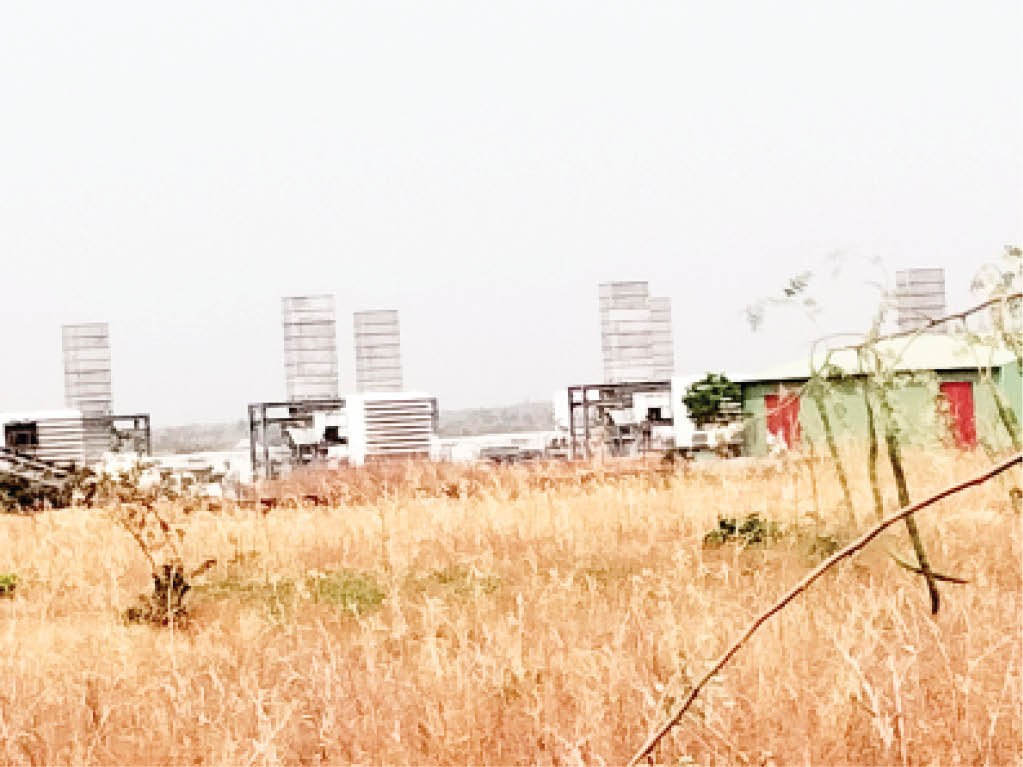When the federal government conceived the idea of a 215-megawatt power plant in Kaduna as part of efforts to revive industries that folded up due to unstable power supply, little did those expected to benefit from the project envisage that it would remain incomplete 11 years after.
The contract for the northern Nigeria’s biggest power plant project, awarded in November 2009 to General Electric and Rockson Engineering for a dual thermal plant, using Low Pour Fuel Oil (LPFO) and natural gas, was expected to have been concluded on December 31, 2013. But almost eight years after the expiration of its deadline and having gulped over N100 billion, the project is yet to take off.
- Onitsha Port yet to function, 7 months after commissioning
- How Nigerians lose millions to fraudulent real estate developers
Located around the Kudenda industrial area, off Nnamdi Azikiwe Expressway in Kaduna, the power plant, a project of the Federal Ministry of Power, was designed to use eight installed turbine units to add to the power supply in the industrial area. It was expected that with its eventual take-off, 12 textile factories located at the Kakuri industrial area would be the main beneficiaries. Due to its delayed takeoff, however, more textile companies have folded up in Kaduna, with thousands said to have lost their jobs.
Findings by Daily Trust on Sunday had revealed that due to several challenges, the deadline for the completion of the project had been shifted several times.
In 2019, an investigation by Daily Trust on Sunday revealed that the initial completion deadline of December 31, 2013 was shifted to June 2014 and later extended to 2017. With the other challenges resulting from poor state of roads that made it difficult to transport imported equipment from the Onne port to site, the initial takeoff of the project suffered delay.
When our correspondent visited the plant, said to occupy 1, 200 plots of land recently, there was no sign of ongoing work as the place looked deserted, with cobwebs on the gate. A security guard on duty informed our correspondent that the site manager was around, but he declined a meeting as he was said to be busy at that time.
However, in March, 2019, the site manager of Rockson Engineering, Paul Adeyemo, had told Daily Trust that the plant was configured to operate, using both natural gas and diesel fuel.
Adeyemo had said the project initially was sited at Kudenda industrial area instead of Kakuri because the Nigerian National Petroleum Corporation (NNPC) was expected to route a gas pipeline tagged the Abuja-Kaduna-Kano (AKK) near the site.

Describing the plant, Adeyemo had said: “It is a 215MW power plant project comprising eight turbine units, which have been installed. Electrical works are at various stages of completion in each unit, and for the first and second units, pre-commissioning has started.”
He said what was left was to install the Power Control Module (PCM), which placed the work at 86 per cent completion level for the project, which comprised engineering, procurement and construction.
“Each of the eight units generates up to 25MW. The plant has also been designed in a way that it will be powered by diesel, and gas in the absence of diesel,” Adeyemo said.
Nevertheless, even as the takeoff continues to face delay, owners of the plots of land where the plant is presently established say they are yet to be reallocated new plots earlier promised them by the then administration of Namadi Sambo.
In 2014, the then Kaduna State governor, Mukhtar Ramalan Yero, approved the allocation of alternative plots to the people affected by the construction of the power plant, but six years after that approval, only few have been allocated alternative plots while others died waiting.
According to Gora Jatau, the paramount ruler of Anguwan Bahago, where the plant is located, some plots were replaced while others were not. Jatau, a former staff of the National Electric Power Authority (NEPA), said 15 of his plots had been taken over by the plant project, but he had only been allocated five.

“Some had four plots and they were given one while others have not received any. Many members of the community have died waiting for their allocations,” he said.
He appealed to the government to complete the project so that the youths can be gainfully employed, and also replace the plots of land promised to community members.
The paramount ruler further appealed to the government to construct the road leading to Ligari Bridge, as well as build a school, a primary health centre and a police outpost for the community, which he said had a population of about two million people.
On her part, Lami Saleh, a farmer who owned two plots of land at the plant site said she had not been given or reallocated any plot. She also appealed to the government to reallocate plots for her so that she can continue to engage in her farming business.

Just like Jatau and Saleh, the then president of the Power Plant Landowners Association, Garba Haruna, had in 2014 said the landowners had at the beginning of the project told the government that they wanted to be relocated and not compensated because they felt the project would bring lasting development to the state. Haruna had said 99 per cent of what was taken was virgin land divided into plots, while only about 10 people had made some construction attempt.
Today, residents of the area are hoping that upon completion, the power plant would serve to resuscitate the moribund textile factories, which once employed over 35,000 people in Kaduna, as well as provide other youths with job opportunities in the power sector.

 Join Daily Trust WhatsApp Community For Quick Access To News and Happenings Around You.
Join Daily Trust WhatsApp Community For Quick Access To News and Happenings Around You.

